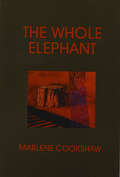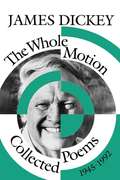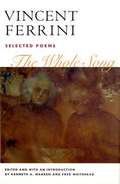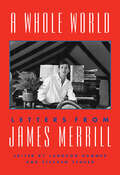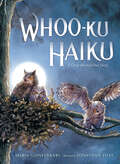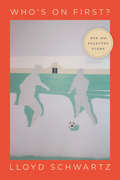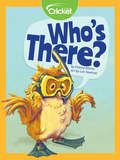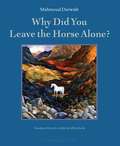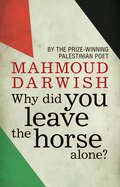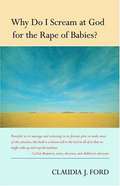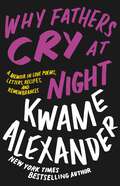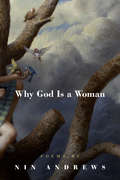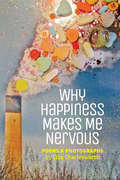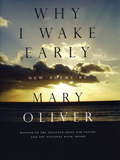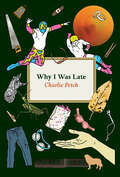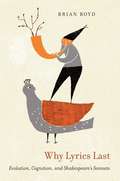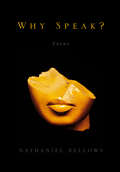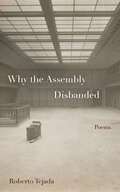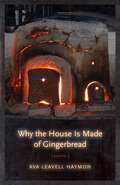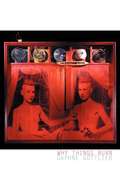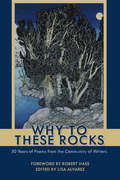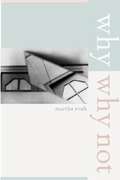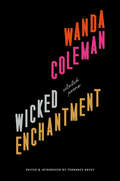- Table View
- List View
The Whole Elephant
by Marlene CookshawShortlisted for the 1990 Dorothy Livesay Award for Poetry (BC Book Prizes) Marlene Cookshaw is a Cheshire cat of a poet whose naturally realized details illuminate a shifting wholeness on the "singing edge" between dream and waking. Hers is a quilted language at once covering and revealing our fascinating ordinariness. The long poem "In The Swim" subtly captures the desperate and humourous beauty of a seemingly plain life closely observed. Other poems leap with deftness and daring across the open plain of our lives, leaving images so strong, so strange, they verge on myth.
The Whole Motion: Collected Poems, 1945–1992 (Wesleyan Poetry Series)
by James DickeyFor over three decades, James Dickey has been one of the nation's most important poets and a prominent man of letters. The Whole Motion collects his poetic oeuvre into a single volume: 235 poems from his first book, Into the Stone (1960), to The Eagle's Mile (1990), along with previously uncollected poems and unpublished "apprentice" works.
The Whole Song: SELECTED POEMS
by Fred Whitehead Kenneth Warren Vincent FerriniWith a voice emerging from class tensions, labor struggles, the Great Depression, and World War II, Vincent Ferrini lived as a people's poet crying out for an end to exploitation and organized greed. Radical Christian gnosis and the conviction that poetry should be more than a display of word-craft distinguished him from poets like T. S. Eliot, infusing his work with dynamic images of Christ as a fighter, a revolutionary, and a martyr in opposing the mighty for the sake of the poor.
A Whole World: Letters from James Merrill
by James MerrillThe selected correspondence of the brilliant poet, one of the twentieth century's last great letter writers."I don't keep a journal, not after the first week," James Merrill asserted in a letter while on a trip around the world. "Letters have got to bear all the burden." A vivacious correspondent, whether abroad, where avid curiosity and fond memory frequently took him, or at home, he wrote eagerly and often, to family and lifelong friends, American and Greek lovers, confidants in literature and art about everything that mattered--aesthetics, opera and painting, housekeeping and cooking, the comedy of social life, the mysteries of the Ouija board and the spirit world, and psychological and moral dilemmas--in funny, dashing, unrevised missives, composed to entertain himself as well as his recipients. On a personal nemesis: "the ambivalence I live with. It worries me less and less. It becomes the very stuff of my art"; on a lunch for Wallace Stevens given by Blanche Knopf: "It had been decided by one and all that nothing but small talk would be allowed"; on romance in his late fifties: "I must stop acting like an orphan gobbling cookies in fear of the plate's being taken away"; on great books: "they burn us like radium, with their decisiveness, their terrible understanding of what happens." Merrill's daily chronicle of love and loss is unfettered, self-critical, full of good gossip, and attuned to the wicked irony, the poignant detail--a natural extension of the great poet's voice.
Whoo-Ku Haiku: A Great Horned Owl Story
by Maria GianferrariStunning illustrations and gorgeous haikus lead young readers through the dramatic life cycle of one of America's most beloved wild animals.Pip. Pip. Pip. PokingA hole. Cracking. Cracking. OutPecks the white owlet.Watch as a pair of great horned owlets peep and squeak in their feathered nest. Mama and Papa hunt for food and fend off predators while the chicks grow strong enough to hop and flap between the branches of their tree, then leap and fly away, ready to explore the wild world around them.In this thrilling nonfiction picture book, a combination of haiku and dazzling illustration shows readers the fierce majesty of one of North America's most ubiquitous wild animals.
Who's on First?: New and Selected Poems (Phoenix Poets)
by Lloyd SchwartzNew and selected poems by renowned poet Lloyd Schwartz. For more than four decades, readers and critics have found Lloyd Schwartz’s poems unlike anyone else’s—a rare combination of the heartbreaking and the hilarious. With his ear for the poetry of the vernacular, Schwartz offers us a memorable cast of characters—both real and imagined, foolish and oracular. Readers experience his mother’s piercing flashes of memory, the perverse comic wisdom of Gracie Allen, the uninhibited yet loving exhibitionists of antique pornography, and eager travelers crossing America in a club-car or waiting in a Brazilian airport. Schwartz listens to these people without judging—understanding that they are all trying to live their lives, whenever possible, with tenderness, humor, and grace. Who’s on First? brings together a selection of poems from all of Schwartz’s previous collections along with eagerly awaited new poems, highlighting his formal inventiveness in tangling and untangling the yarn of comedy and pathos. Underlying all of these poems is the question of what it takes and what it costs to make art.
Who's on First?: New and Selected Poems (Phoenix Poets)
by Lloyd SchwartzNew and selected poems by renowned poet Lloyd Schwartz. For more than four decades, readers and critics have found Lloyd Schwartz’s poems unlike anyone else’s—a rare combination of the heartbreaking and the hilarious. With his ear for the poetry of the vernacular, Schwartz offers us a memorable cast of characters—both real and imagined, foolish and oracular. Readers experience his mother’s piercing flashes of memory, the perverse comic wisdom of Gracie Allen, the uninhibited yet loving exhibitionists of antique pornography, and eager travelers crossing America in a club-car or waiting in a Brazilian airport. Schwartz listens to these people without judging—understanding that they are all trying to live their lives, whenever possible, with tenderness, humor, and grace. Who’s on First? brings together a selection of poems from all of Schwartz’s previous collections along with eagerly awaited new poems, highlighting his formal inventiveness in tangling and untangling the yarn of comedy and pathos. Underlying all of these poems is the question of what it takes and what it costs to make art.
Who's There?
by Dianne MoritzWhat else is there to do on a hot, summer day? Head to the flea’s pool, of course! In this funny rhyme, all the animals head to the pool to cool down.
Why Did You Leave the Horse Alone?
by Mahmoud Darwish Jeffrey SacksAt once an intimate autobiography and a collective memory of the Palestinian people, Darwish's intertwined poems are collective cries, songs, and glimpses of the human condition. Why Did You Leave the Horse Alone? is a poetry of myth and history, of exile and suspended time, of an identity bound to his displaced people and to the rich Arabic language. Darwish's poems - specific and symbolic, simple and profound - are historical glimpses, existential queries, chants of pain and injustice of a people separated from their land.
Why Did You Leave the Horse Alone?
by Mahmoud Darwish Mohammad ShaheenA stunning new translation of Mahmoud Darwish's intertwining poetic narrative, presenting a profound portrait of the Palestinian people, the human condition, and Darwish's own hopes and dreamsSince Mahmoud Darwish's death, his poetic writings continue to be read by an audience in awe. This is a collection of autobiographical poetry designed to give an insight into the wider human condition. Darwish explores the meaning of life, identity, and the impact of exile. Hailed as the most important Arab poet of the modern day, Darwish's voice has come to represent a generation and the Palestinian people in the midst of the tense political situation in the Middle East. While Darwish explored themes of lost Eden, exile, and life after death, he resisted classification as a spokesperson for the Palestinian cause, and refused to use his art for purely political ends. Darwish's was a nomadic existence, much of it spent in international exile, and these experiences lent his writing a cosmopolitan edge—they partake of a worldwide mythology.
Why Do I Scream at God for the Rape of Babies?
by Claudia J. FordAt the center of Why Do I Scream at God for the Rape of Babies? is the tragic story of a five-month-old South African baby named Vyanna who is left alone in a Johannesburg porn theater by her homeless mother and then gang-raped. The story's heart, however, is one of healing, courage and growing love that Vyanna's adoptive mother experiences from the moment she sees the little girl. Journal entries, letters to friends and South African courts, and memories weave together Ford's two-year chronicle of a most unusual—and rewarding—mother-daughter relationship.
Why Fathers Cry at Night: A Memoir in Love Poems, Letters, Recipes, and Remembrances
by Kwame AlexanderThis powerful memoir from a #1 New York Times bestselling author and Newbery Medalist features poetry, letters, recipes, and other personal artifacts that provide an intimate look into his life and the loved ones he shares it with. In an intimate and non-traditional (or "new-fashioned") memoir, Kwame Alexander shares snapshots of a man learning how to love. He takes us through stories of his parents: from being awkward newlyweds in the sticky Chicago summer of 1967, to the sometimes-confusing ways they showed their love to each other, and for him. He explores his own relationships—his difficulties as a newly wedded, 22-year-old father, and the precariousness of his early marriage working in a jazz club with his second wife. Alexander attempts to deal with the unravelling of his marriage and the grief of his mother's recent passing while sharing the solace he found in learning how to perfect her famous fried chicken dish. With an open heart, Alexander weaves together memories of his past to try and understand his greatest love: his daughters. Full of heartfelt reminisces, family recipes, love poems, and personal letters, Why Fathers Cry at Night inspires bravery and vulnerability in every reader who has experienced the reckless passion, heartbreak, failure, and joy that define the whirlwind woes and wonders of love.
Why God Is a Woman
by Nin AndrewsWhy God Is a Woman is a collection of poems written about a magical island where women rule and men are the second sex. It is also the story of a boy who, exiled from the island because he could not abide by its sexist laws, looks back with both nostalgia and bitterness and wonders: Why does God have to be a woman? Celebrated prose poet Nin Andrews creates a world both fantastic and familiar where all the myths, logic, and institutions support the dominance of women.Nin Andrews's books include The Book of Orgasms and Sleeping with Houdini.
Why Happiness Makes Me Nervous
by Liza CharlesworthIn words and pictures, Liza Charlesworth's new book, Why Happiness Makes Me Nervous, captures the poetic journey of a girl's complicated coming of age. Loneliness, divorce, loss, love, burgeoning sexuality, and those awkward, epic years between adolescent and adulthood are explored in the pairing of these riveting poems and vivid photographs.
Why I Wake Early
by Mary OliverThe forty-seven new works in this volume include poems on crickets, toads, trout lilies, black snakes, goldenrod, bears, greeting the morning, watching the deer, and, finally, lingering in happiness. Each poem is imbued with the extraordinary perceptions of a poet who considers the everyday in our lives and the natural world around us and finds a multitude of reasons to wake early.
Why I Was Late
by Charlie PetchWith kitchen-table candour and empathy, Charlie Petch's debut collection of poems offers witness to a decades-long trans/personal coming of age, finding heroes in unexpected places. Why I Was Late fuses text with performance, brings a transmasculine wisdom, humour, and experience to bear upon tailgates, spaceships, and wrestling rings. Fierce, tender, convention re-inventing—Petch works hard. And whether it's as a film union lighting technician, a hospital bed allocator, a Toronto hot dog vendor, or a performer/player of the musical saw, the work is survival. Heroes are found in unexpected places, elevated by both large and small gestures of kindness, accountability and acceptance. No subject—grief, disability, kink, sexuality, gender politics, violence—is off limits. A poet so good at drag they had everyone convinced that they were a woman for the first forty years of their life, Petch has somehow brought the stage and its attendant thrills into the book. Better late than. And better. "Charlie Petch's Why I Was Late is a poetic debut with the wisdom of a sage and the emotional range of an expert comedian. … Do yourself a favor and read this book. This is a master at work."—Kai Cheng Thom, author of I Hope We Choose Love: A Trans Girl's Notes from the End of the World
Why Lyrics Last
by Brian BoydIn Why Lyrics Last, the internationally acclaimed critic Brian Boyd turns an evolutionary lens on the subject of lyric verse. He finds that lyric making, though it presents no advantages for the species in terms of survival and reproduction, is âeoeuniversal across cultures because it fits constraints of the human mind. âe#157; An evolutionary perspectiveâe" especially when coupled with insights from aesthetics and literary historyâe"has much to tell us about both verse and the lyrical impulse. Boyd places the writing of lyrical verse within the human disposition âeoeto play with pattern,âe#157; and in an extended example he uncovers the many patterns to be found within Shakespeareâe(tm)s Sonnets. Shakespeareâe(tm)s bid for readership is unlike that of any sonneteer before him: he deliberately avoids all narrative, choosing to maximize the openness of the lyric and demonstrating the power that verse can have when liberated of story. In eschewing narrative, Shakespeare plays freely with patterns of other kinds: words, images, sounds, structures; emotions and moods; argument and analogy; and natural rhythms, in daily, seasonal, and life cycles. In the originality of his stratagems, and in their sheer number and variety, both within and between sonnets, Shakespeare outdoes all competitors. A reading of the Sonnets informed by evolution is primed to attend to these complexities and better able to appreciate Shakespeareâe(tm)s remarkable gambit for immortal fame.
Why Speak?: Poems
by Nathaniel Bellows"A smart and powerful debut."--Library Journal A debut collection, exhibiting exceptional narrative and lyrical gifts, that explores the realms of memory, human emotion, and the natural world.These layered, braided narratives combine images of landscape and nature, childhood memories and family history, evoked paintings and performances. Nathaniel Bellows's verse is intimate yet inviting, dark but hopeful: "I could not saw the fallen tree--not all / of it had fallen--because somehow each spring, / the rotted half still mysteriously bloomed."
Why the Assembly Disbanded
by Roberto TejadaPushing the boundaries of Latinx literature and what constitutes a borderlands poetics.Throughout Roberto Tejada’s body of work, the renowned poet and celebrated critic has explored themes of Latinx culture, politics, history, language, and ecologies. In his latest collection, Why the Assembly Disbanded, he presents a unique contribution to Latinx letters that reflects on the relations between the United States and Latin America, especially their real and symbolic borderlands.Immersive, postmodern, and philosophical, Why the Assembly Disbanded provides an associative, critical Latinx aesthetic connecting the Mexico–United States borderlands to Latin America’s neo-baroque heritage. Migrants, settlers, tourists, and exiles moving across various hemispheric landscapes are featured in these exuberant, capacious, and self-reflexive poems. Tejada relates the ravages of white supremacy in our culture that, together with immigrant precarity, turn home into a place of foreboding and impending eviction, even as a dream-weather makes room at last for scenes of possibility and attainment in the account of human history. The sweeping futuristic vista open on to narratives of colonial extraction, human displacement, abuses of capitalism, mass media spectacle, the antagonism of language and technical images in the sensorium of urban and digital life-worlds, and the relations of desire encouraged by pictures and words in the economy of attention. Los Angeles and Mexico City figure prominently in poems committed to voicing modes of formation and community in an intersectional reckoning of personhoods prompted in work by artists Betye Saar, Amiri Baraka, Connie Samaras, and Rubén Ortiz Torres.With language given to pageantry, tonal precision, and a hopeful lyric radiance that can accommodate ecstasy and justice, Roberto Tejada’s carnivalesque, borderland imagery pushes the boundaries of Latinx literature. World-building by way of reverie, speculation, and retro-futurist tableaux, and with vivid, sometimes violent particularity, his poems enact hallucinatory realities of the hemisphere: an imagination that triangulates history, lyricism, and art as social practice.
Why the House Is Made of Gingerbread: Poems
by Ava Leavell HaymonIn Ava Leavell Haymon's third collection, an unremarkable, harried, contemporary woman named Gretel finds herself at midlife overtaken by the Grimms' household tale "Hansel and Gretel." The violence and terror in that story supplant the memory of her own childhood, and the fairy tale retells itself in a sharp succession of surprising poems. <P><P>The witch, the sugar house, Gretel's brother, her passive father, his cruel second wife, the sinister forest -- all these and more rise like jazz motifs to play themselves in the present. Addressing themes such as hunger, child abuse, betrayal, cannibalism, and murder in a tone by turns disturbing and humorous, Why the House Is Made of Gingerbread is most certainly not a book for children.
Why Things Burn: Poems
by Daphne GottliebFor many performance poets, the simple act of writing down the words can kill a poem's spirit and energy. Not so with Daphne Gottlieb. In Why Things Burn, Gottlieb tackles sexuality, lesbian issues, rape, urban life, and a host of other topics with the same power of her live performances.
Why to These Rocks: 50 Years of Poems from the Community of Writers
by Robert HassFifty years of poems from the Community of Writers’ poetry workshop The Community of Writers (formerly Squaw Valley Writers’ Conference) celebrates fifty years of its annual summer poetry workshop in Olympic Valley, California, with this collection of one hundred and forty poems first composed there. Edited by writers workshop codirector Lisa Alvarez and introduced by longtime poetry director Robert Hass, the book is divided into three sections: poems that evoke the Valley’s physical setting, with its granite-and-pine mountain beauty; poems that peer into the poetic process, filled with inspiration and idiosyncrasy; and poems of all shapes and kinds that owe their origins to the workshop and its productive morning review sessions. Contributors include both workshop staff and participants, among them Lucille Clifton, Sharon Olds, Al Young, Matthew Zapruder, Harryette Mullen, Galway Kinnell, Rita Dove, Cornelius Eady, Robert Hass, and Forrest Gander. The title of the collection comes from a question posed by original poetry director Galway Kinnell: &“Then why to these rocks / Do I keep coming back why.&” It speaks to the special community nurtured in this stunning setting, one that has inspired poets worldwide—many of whom developed significant bodies of award-winning work in its creative and generative atmosphere.
Why / Why Not
by Martha Clare RonkA book of short poems written in between--in between thoughts, questions, answers, conclusions. It is a stage play of a book, divided into four parts/acts and inspired by paintings, movies, Shakespeare, Chandler, and Los Angeles.
Why You Should Laugh Three Times a Day
by Kimberling Galeti KennedyWhy You Should Laugh Three Times a Day always has a positive message included in each imaginative, inspiring and rhythmic story it tells. Furthermore, it is sure to be a joyful and entertaining read for you and every beloved child in your life.
Wicked Enchantment: Selected Poems
by Wanda ColemanA voice for justice, anti-racism, and equality—here is the greatest and most powerful work of the people’s poet, Wanda Coleman.One of the most talked about literary collections of the year is this collection by a beat-up, broke, and Black woman who wrote with anger, humor, and clarity about her life on the margins. Wicked Enchantment: Selected Poems is a selection of 130 of Coleman’s poems spanning four decades, edited and introduced by Terrance Hayes. Although Coleman was rejected by the literary elites during her lifetime, here’s what people are saying now about Wicked Enchantment:“Wanda Coleman is not just wickedly wise, she is transcendent.” —The Washington Post“These poems are wildly fun and inventive . . . and frequently hilarious; they seem to cover every human experience and emotion.” —The New York Times“Wanda Coleman’s work has that ineffable quality that accompanies poetry you understand in your belly and your head. . . . It is an unmistakable style that propels a Coleman poem, and draws us into it.” —Reginald Dwayne Betts“Wicked Enchantment has words to crack you open and heal you where it counts—hateful and hilarious, heartbroke and hellbent.” —Mary Karr, New York Times bestselling author“One of the greatest poets ever to come out of L.A.” —The New Yorker“One of the most exciting, original, deliciously dangerous voices of the 20th century.” —The Irish Times“Required Reading” —Bustle“Best Poetry of 2020” The New York Times, The Washington Post, The Irish TimesWinner California Independent Booksellers Alliance’s 2020 Golden Poppy Award for Poetry
